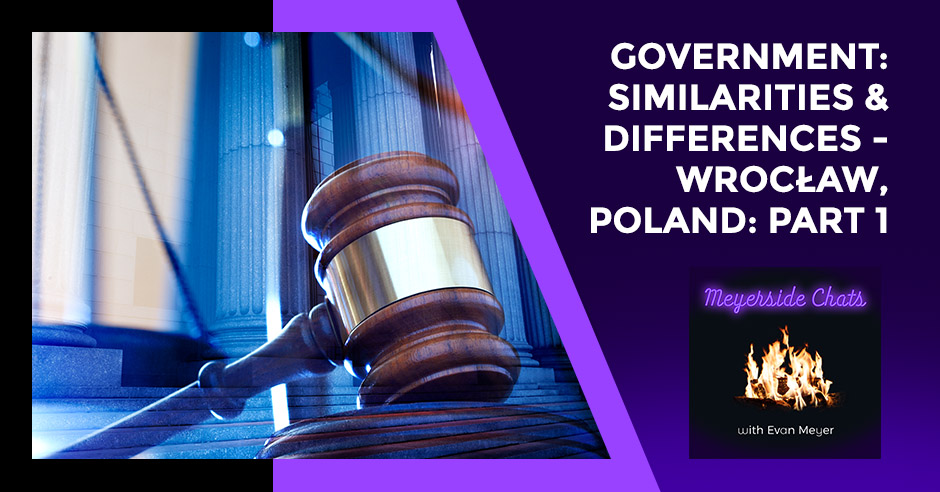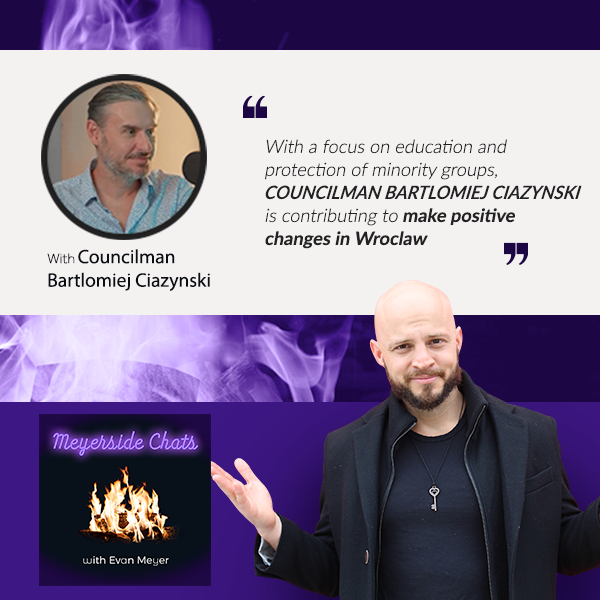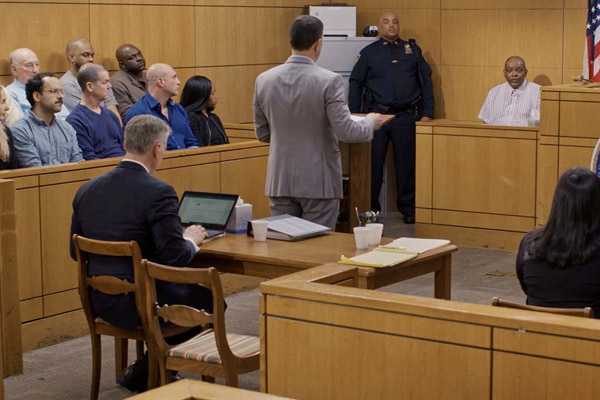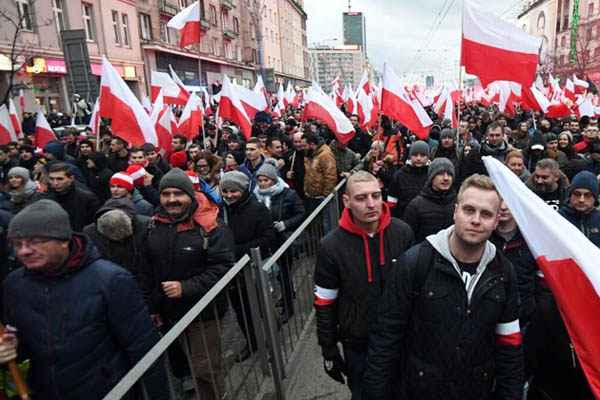
The world is vast, and with it comes different places that have different ways of looking at things. What can we learn from them? Here to shed some light on what it’s like to live under the local government of Wrocław, Poland, is Councilman Bartlomiej Ciazynski. He is the Deputy Chair of the city council and Social Advisor to the Mayor of Wroclaw for Tolerance and Counteracting Xenophobia. The city has recently experienced a rise in population to become the third largest city in the country as they welcomed close to 100,000 Ukrainian refugees to their population of approximately 600,000. In this episode, he chats with host Evan Meyer about their policies regarding the discrimination of minority groups and how he proposes expanding their policies to protect the LGBT community. He also highlights the need for regulation regarding information being spread and what’s being taught at schools. Stay tuned for more of the great insights you can take away from this episode.
—
Listen to the podcast here
Government: Similarities & Differences – Wrocław, Poland: Part 1
Councilman Bartlomiej Ciazynski
How are you? Welcome to Wroclaw.
Thank you. This is quite a city.
First information. The third biggest city in Poland. It was fourth but it changed months ago. It’s like Chicago.
It’s Warszawa, if I say it correctly.
Yes. Warsaw, Krakow, and Wroclaw.

Congratulations.
Thanks to the Ukrainian refugees.
That was the influx. That pushed it from 4th to 3rd?
Ukrainian people like Wroclaw. They choose this city a lot. Now we are the third. Thanks to that.
A pretty big surge there. Is it now 10% or 20%?
Even more. It’s approximately 20% because we are close to 100,000 Ukrainians in Wroclaw. Wroclaw is 600,000, so it’s 50%, not 20%. I don’t know if I’m mathematically mistaken. I’m sorry. You have data and now you can count.
It’s enough to push you to the third biggest city, which is impressive and it’s beautiful here. I think I could be wrong in this, but I didn’t know much about Wroclaw. I came to Poland and then learned more about Poland. It is such a wonderful place. It’s charming. It’s bigger than I expected. It has so much rich culture in history, an incredible university, and tons of cool events are here. I know you guys hold lots of cool stuff.
It’s nice to hear that. It is a very interesting city. We have a long and huge history of a lot of nations because it was German, Czech, and Polish. It is melting. This melting point gives a lot of energy to the city. Now, we have so much visitors, refugees, and migrants from other countries. It is good for the city. It is good for the quality of living and domestic for the natives. I think those people inhabitants like that now we have a lot of visitors, guests, and new inhabitants. We think and we want that a lot of new people or new inhabitants in Wroclaw will stay here, not just a month or for a year, just forever.
[bctt tweet=”It is a very interesting city with a long and huge history with a lot of nations because it was a German city, it was a Russian city, it was a Polish city. This melting point gives a lot of energy to the city.” username=””]
That’s part of the goal.
It’s part of the goal. It’s part of the city policy. We want to have them and we try to make them feel good here.
I know one of your major initiatives being on council is to combat xenophobia.
Yeah. I’m a city counselor and also a special advisor to the mayor for tolerance and counteracting xenophobia. I’m doing that for several years in special times in this matter. I think we have done some progress in this matter. Even that, there is a position like an advisor for tolerance and counteract xenophobia. I’m the first one with this mayor. It’s significant because, before me, there was no such a position. This is important for the mayor and the city authorities.
It’s impressive that there is a position specifically for that. The position, if I understand where it was tolerance in xenophobia.
To counteract xenophobia. I’m not supporting xenophobia.
Since you’ve joined in this capacity, what are some of the advancements that you’ve seen here? How does that relate to some of the current events that are going on, whether it’s with Ukraine, racism, LGBTQ, and any of the above?
The reason why the mayor created such a position was that we had some problems with xenophobia, racism, and antisemitism. For example, in 2015, there was a huge thing that happened in Wroclaw. Some fire activists burned a Jewish puppet on the city square. It was famous. This action was on CNN, BBC, and Al Jazeera. From that time, a lot of people in Poland and all over Wroclaw City with some guy burning Jewish doll or puppet. There were some other actions I didn’t want to say because I didn’t want to bore you. We had a lot of situations with antisemitism or racism. It was hate speech in general.
I proposed to the City Outreach. I proposed to Mayor Jacek Sutryk some actions to counteract this. Now in 2022, we have no action. Those activists or nationalists now are not active in Wroclaw because we interrupt those actions. We pursued them a lot in courts and the police. Now they know that they cannot do this in Wroclaw without any consequences and they don’t do that. There are not such many radicalist in Poland, so they need to move to other cities where they can do this. Wroclaw is not a place to do such a thing without any consequences in court, in police, or in the prosecutor’s office.

Plus your incident rating regarding this is close to zero.
Close to zero. Those people know that if they are celebrating Independence Day with hate speech, they know that me, personally, with some other clerks and with a lawyer will be there and we’ll watch them. If they do something bad or a criminal hate speech, we will interrupt them. We will pursue them to court and the court will sentence them.
They know that that’s you.
That’s my job.
Do you show up at their door? Do you knock? Are you behind the police and you stand there?
The police do that. We have a lot of sentences from the court. The court said many times, “This is illegal. You cannot do this. Hate speech in Poland is a crime. We will sentence you if you do that again.” It’s a zero-tolerance policy.

How are we still having this problem in America?
You are different in criminal law. You treat freedom of speech and freedom of country very differently. Not only in Poland, but in Europe, our boundaries are not so wide. In the United States, you can read Mein Kampf by Adolf Hitler. You can buy it and you can have a show, for example, Nazis signs, the swastika. I don’t know how it’s in English. You can go on the streets with the swastika. You can do this in the United States because it’s the mother of freedom of speech. In Europe, you cannot do this because this is crossing the red line. That’s the difference.
I know that freedom of speech has its place in Europe. There’s no freedom of speech here, but you draw out the line. What is the line? Is the line anything that represents Nazi Germany?
In Polish Constitution, we have a law that said exactly that Nazism and Communism are bad. You cannot promote Nazis. You cannot establish a Nazis party in Poland, and you cannot promote this ideology. It’s one of the examples. For me, we have European conventions that you cannot hurt someone’s feelings with your words and actions, and this is the line. We know this idea. It’s from the 18th Century that freedom ends when hurting someone starts, feelings or physical.
[bctt tweet=”The freedoms end when hurting someone starts.” username=””]
In polarized matters, I’m guessing Poland and Wroclaw have polarization like any other place. How do you know what’s hurting someone’s feelings and that needs to be addressed as something that’s not allowed versus something that’s simply a polarizing event that people feel very strongly against?
When someone or some activist says that Jews kill small babies, it is obvious. It’s not true and it hurts some communities. When someone says that we have a huge problem nowadays for 2 to 3 or maybe more years in Poland about hate speech targeting the LGBT community. For example, we have in Poland also in Wroclaw. I sue this organization because in Wroclaw, we have an organization that’s promoting the idea that LGBT people hurt babies. They promote this idea on billboards.
They suggest that LGBT people commit sexual crimes against kids more than non-LGBT people. You can find this sentence on billboards and on websites. It’s a huge problem. When I pursued in courts and so on, for example, hate speech against Jews, Arabs, or Ukrainians, it was not a big issue because I have this Polish criminal law that says that hate speech against nationalities and religions is a crime. We cannot find this about sexual minorities. I cannot pursue them in criminal law. I pursue them in civil law. It’s a lawyer thing.
Where are they getting that from? Are they using a piece of information?
They said that they have some data and scientists from the United States that said being gay or lesbian is something unnatural and hurt kids. They put this BS on websites and on billboards. It’s not a crime in Poland when you are talking BS against LGBT, we are doing this in different ways. It is much more difficult when it goes to antisemitism, but we are trying to do this.
There is that line of hurting feelings. You can talk BS at whatever you want, even if it is hurtful. There is some line, it sounds like, saying that they hurt children. It seems to be okay from a criminal perspective but not okay from a civil perspective. There is a line. If you say that they kill babies, that would be a criminal offense.
No, if you are talking about LGBT people. If you say Iwan kills a baby, it’s a crime. When you say LGBT kills a baby, it’s not a crime because crime is when hate speech targets nations or religions but not disabilities or sexual minorities. This is the law. We need to change it.

Did you grow interest groups?
We have a few interest groups who can be a victim of criminal hate speech, but it’s not enough. For example, there are no sexual minorities there. Now, it’s a problem because we have a very conservative government and they want to change it. We need to change the government. We have to have this change and a lot of other changes.
The nuance there is something that’s recognized as an organized group in a sense or something well established perhaps is considered a criminal offense. If it’s an interest group, it’s not.
Even European Union is working on a European Law that will help to counteract hate speech also against LGBT people.
Is that the EU Law specifically?
Not now but they are working on it. There are some soft recommendations that you should have for this law. You should have this in education and some programs but not in criminal law. Criminal law is a matter of national laws, but not EU Law.
You can’t be accused as a criminal in the eyes of the EU. In Poland, it’s strict with the national policy.
Exactly.
How does that affect, to some degree, the national policy versus local policy? There are some differences in how we do things in the US. If I understand correctly, there are limitations on new taxes that you can create new revenue streams. We were talking earlier a little bit about some of the complexities since a lot of new mandates have been required of you, but the funds aren’t there. You can’t necessarily create new taxes. Do I understand that correctly?
You do. Especially from the US perspective, it’s something odd maybe but yes. This is not Poland. This is not a Federal State. It’s the United States. These competitions for local government are not so big, not so wide. Like justice or taxes, it is in Warsaw. It is in the central government. They decided, “We cannot like you. You have 8% tax.” I’m guessing because I don’t know.
In Kansas and in California, you have 12%. We cannot do that. We can establish some local taxes like the tax for having a dog. This is a type of tax for having a flat. This is in local government but these big taxes, like income tax, it’s from the government. They establish that. Theoretically, they have to share with the local government. It’s like half of that, 50/50. We talk in our local government. Our revenue office takes the taxes and then the government shares these taxes with us 50/50. This is when we are talking about this income tax. It’s also my government. The central government gives us some things to do like schools. Schools are in local authority, but we need to have money for teachers and buildings, so they have to give us some money to do this.
Give an example here. They said you need more schools or more classes. What was the mandate that requires more resources that you don’t have?
Schools are in the local government, but the schools are from the central government.
[bctt tweet=”Schools are in the city, in the local government, but money for the schools come from the central government. ” username=””]
Always.
Not always. In law, it should be like this. In Wroclaw, the money for schools is approximately 2zł billion. Złoty is a Polish currency. They also give us 1zł billion and we need to find another 1zł billion to provide everything. To have money for teachers, kids, and schools.
We were talking about the amount of what they are asking for the central government. They asking for that requires X billion dollars, but you only have $1 billion. What do you do in this situation? They must know that. They know that they asked bigger than you could possibly handle, and you are restricted in what you can and can’t do. How are you handling this? What’s the solution?
It’s pure politics. Local authorities, especially in huge big cities. Poland is not from the law and justice party. This is the right party in Poland that has governed for several years. Local authorities don’t cooperate a lot. The central government doesn’t cooperate with local authorities. The central government punishes locals for this lack of cooperation. They said, “You want 2zł billion? We don’t have it. I will give you 1zł billion.” At this point, what can we say? We can say to our inhabitants that we can build them another tram line or SAP.
You take the money from one place and you are moving it to another or is the compromise to not provide certain things because of that?
We have money. Thanks to our inhabitants because the biggest part of local budgets is from the income tax. If Polish people are having more money from 10 to 20 years because they are much more than 10 or 20 years, thanks to that. We have more money from their taxes. We can build new schools and build some new tram lines. This is what is happening a lot in Wroclaw right now. It’s not fair because, in law, there is such an agreement that if you ask for something like for education to do something, you need to cover it. You need to provide money for that.

Education is in the central government. If they want us to control schools, to do schools, or to do teaching, they should provide money for that, and they don’t do that. They do that in half. It’s not a big problem in big cities because, in big cities, people are richer. It’s quite a huge budget. When I’m talking with local authorities from small cities, they say to me, “In our budget, education is 80% of our budget and we have no money for other things.”
I am talking a lot about education because it’s all important. It’s always the biggest part of the local budget, always. In Wroclaw, it’s 2zł billion in 6zł billion budget. In a small city like my hometown, my hometown is 30,000 inhabitants city, so it’s not big. It’s 60% of the budget. It’s for education. It should be none. It should be zero because every złoty should be from the central government for education.
How is this being addressed? Are people fed up with this?
People don’t know about this. People put babies and little kids in schools, and they want to have a good education. They don’t care if it is from the central government or the local government. They don’t care about that. They want to have a good education, schools, and teachers everywhere and some crappy money. It’s an international problem that the teachers are not enough, but people don’t know if it’s from the mayor, prime minister, or minister of education, so it’s inside knowledge.
That’s one of the ideas of this show in general. I have realized from being civically active on my own in Santa Monica and Los Angeles that people don’t generally understand. Most people don’t know how basic things work in government and they are not super concerned with it. They do tend to get very frustrated with national or international politics. Everyone seems to watch the news and get the headlines and get all ramped up about things they can’t control. My goal here is to get them to take action on very often things. They can control their local communities to get involved. It’s always been what I stand for.
I agree. We used to say in Poland that pressure makes sense from the people. There are so many examples that pressure makes sense. We have the book. It’s a book for learning in schools that were full of BS. It’s a book about the history of Poland. It’s a new one from this far-right minister of education. He asks some far-right scientist or professor to write this book for kids. There were so many BS like LGBT are sick, in vitro is bad, and Kaczynskis are good in Polish history. There is no Lech Walesa in Polish history like that doesn’t exist.
Can you explain this to the American audience who may not know that word?
Lech Walesa is like Havel in Czech. It’s our Nelson Mandela, the leader of the anti-communist opposition, the mortality opposition many years ago. He was also the first president of Poland in the ’90s. He’s a hero in Polish history. He’s alive and well, but he’s in a conflict with the ruling party now. They want to erase him from history and they do this in schools. When parents saw this book, they said, “What is happening here?” There were so many protests and pressure. They said that they would change this book. They will erase this BS in this book.
This was a new history book that was being proposed.
I wrote some manifesto in Wroclaw to teachers that they shouldn’t teach from this book. My boss, my mayor, accepts this and also stands and says, “Please, teachers, don’t use this. Parents, please don’t buy this crap. Don’t use it.” It happens in a lot of cities in Poland, especially big cities. First was the mayor of a small city is in the East part of Poland. He started, and after him, a lot of mayors, teachers, professors, and scientists said, “You shouldn’t use this book.” The central government said that first, they would erase the most controversial parts of this book, and secondly, they would find some other book. The pressure makes sense, and there are a lot of examples of that pressure makes sense.
What do you think that says about where we are at as a planet in terms of the information that people receive and what they read and believe? How do they start going about living their life in that way, especially now with social media with deepfake, artificial intelligence, and bots? Everything is practically writing content. Lots of content writers, like automated content writing, write blog articles. Where are we with the level of trust that you would put on the general information that’s out there?
First, about the climate here, we are on the edge. Secondly, that truth is caring about the truth. It’s one of the biggest challenges right now. For many years, but now it’s a very big problem, we don’t listen to the scientists. We don’t read. We are in information bubbles. We need to have some regulations. We need to have some ideas. Regulation for social media that we can have control over the information. We need to control the information because there is no more something like the truth right now. Everyone has their own truth, and they shouldn’t be like that. There are some facts or objective truths like we have a climate crisis. That there was a Holocaust. Objective facts. We need to care about these facts because now, we don’t care about them.
[bctt tweet=”Caring about the truth is one of the biggest challenges… We need to care about the facts. ” username=””]
How do you get to that fact? I love asking this, but when I ask people what a fact is, I get different answers. One of the things they say is first, we have to get into agreement on what the definition of a fact is because I don’t know the 1) People agree on that, but 2) People even care to agree on it. If they don’t care to agree on it, then they continue to live in their bubble. If their goal is to find common ground, and one of the things is having a common lexicon and vocabulary. When we say fact, we need to be talking about what fact means. People just say, “These are the facts.” What does a fact mean to you? I will ask you. What is a fact?
Fact is an objective truth. We need to care about the language. For example, I don’t like the sentence fake news. What is fake news? Is it a lie or is it true? Sometimes not always, there are some great parts between Black and White. Sometimes there are great, but there are objective facts that we can say something is a lie or true. That’s why I don’t use the word fake news. I use the word lie. Is someone lying or not?
Your ex-president really loves them. Donald Trump, “It’s fake news.” Even Donald Trump is ignorant that he can say that the climate crisis is a lie. Look at the difference, even in a language or even in English. When you say, the climate crisis is a lie, all you say is a climate crisis is fake news. It’s a difference. The Pandemia of COVID is fake news. Pandemia of COVID is a lie.
I hear the difference, so I don’t use the word fake news. It’s a lie or it’s the truth. Why I’m saying that? It’s because we need to care about our language. We need to control our language. It’s the first thing. Secondly, I know that it’s not an American way of doing things, but we need to have regulations for charging and pursuing life.
For example, journalists or communists. People have to care about politicians. Politicians and journalists are leaders of opinion. They need to start saying the truth and control themselves because they are leaders of opinions. It’s a matter of liberation and law, sometimes criminal law. It is linked with the first part of our conversation. When I pursue someone for hate speech, it’s a matter of regulation because I have this regulation in criminal law, so I need to have it. The language law and last but not least, education.
You cannot say in school as a teacher that there is an opinion that this was like that or that. About Darwin’s evolution. I think that there are some facts in history and science that are objectives. I have such a story because my teacher in high school started to with us that evolution is not objective because he was a very religious man. He said that it’s not true, and then kids believe in teachers. They should believe in teachers, language, law, and education.
Things as compelling as Darwinian evolution. It’s not a law. It’s not proven in the way that you would perform a physics-proof, and it’s technically still a theory, as is general relativity. How do you differentiate that even now? It’s so compelling. There’s no other explanation that’s as compelling as that. That’s why we all believe it. It makes so much sense. You don’t need to look very hard to figure out why evolution. You have a child. I have one too. You can see that these little kids are monkeys from the door.
Maybe evolution, this Darwin theory is not a pure example of objective truth. We talk about it a lot in Wroclaw and about in vitro methods for having a baby. Now, we give money from the local budget to parents who want to use this in vitro method. It was ten years of discussions about this because religious and conservative people said that we cannot because our religion said that it’s not natural and not good.
Now, we have some more progressive authorities here, so we budget that. We still can hear that it’s not science and that it can hurt someone with in vitro method. In this book that we are talking about, this author said that babies from in vitro are from production. They are not from birth. Who can love them? It was in the book for schools. There’s no problem if someone writes something like that and hundreds of people buy this book and it’s a freedom of speech. I understand that, but when you put this BS in a book for learning, it’s a problem.
It also hurts a lot of people who maybe couldn’t have had a natural birth.
I’m cooperating with some other lawyers. You can see me as some crazy guy who pursues everybody.
To some degree, that’s your job.
I’m a lawyer. I will sue the author with some other lawyers. It’s a corporation of lawyers. We are now working on that and we will sue the author, the ministry of education, and the company that published that for this word about in vitro.
You guys have a nice doing for the policy here in Poland. It’s almost as good as America.
As an attorney, I would like to have these opportunities like in States.
You could sue everybody in America. If you don’t like something, you just walk in front of a car and then sue the guy that hit you.
This type of sue that I described in this book is a controversial thing about faith in Poland. I don’t know how it will end. We think that we will win this with the trial, but it’s controversial. In the United States, it would be like this consensus after two days. In Poland, there will be three years trial.
We have a couple of minutes left and I want to jump back on one thing that is important and that is where to draw the line between fact and fiction or a lie. Where is their gray area? Where is their perspective? Darwinian evolution is one of them. What do we think we should leave people with when we say, “Here’s the information at hand. There are lots of information out there.” The stuff that you should take as truth. That means to accept that is your personal truth versus understanding what objective truth is, and where we need to create boundaries so that people don’t get so angry with one another when someone feels differently than them on something.
That’s part of what I’m here to do get people to see that there are lots of ways of looking at things, and we don’t have to call people mean names. We are not going to get anywhere if we do this back-and-forth hateful approach to solving problems. Even people we disagree with the most need to be thought of in a way that that’s their perspective. When it comes to hate speech and things like that, there is a line. The last point here is what do we want to leave people with to tell in terms of how to look at information and think about it as a truth or a fact so that they can live their lives understanding the world a little better?
It’s a tough one. First, we need to be very respectful and listen to each other. You have this in the United States. When African-Americans said don’t use N-word. We have some other examples in Poland for this. Just do it because they want to do that. Secondly, listen to the science. There are still some people from science, some scientists, and professors who know what the truth is and what is not. Education and we have to read more books than Facebook. I’m sorry but it has to be something like that. Third, I will come back to the regulations. We need to care about the truth and we need to protect the truth in some ways.
Thanks to the law and regulation, we need to protect the truth. The truth wants to protect herself if I can say this in English because it’s not enough. With this technological progress and social media, everyone can connect with people. This is great. This is a good time for humanity, connecting work, and globalization, but there are some consequences. We need to see these consequences and then protect these values that are threatened. I don’t mean that we need to shut down Facebook and Twitter. We have to protect the truth and have some regulation on that, and it is happening slowly.
I want to thank you for taking the time to meet with me.
Thank you that you are having me. It was interesting and surprising for me that some guy from Santa Monica, California, had me in Wroclaw that sent me an email like, “Let’s talk.” I’m sorry for my English. I know it was a lot of mistakes, but I think that you understand something.
It’s important that people understand that the world is bigger than they think it is, and there are a lot of people out there. There are a lot of ways of looking at things. Law is different in different places. The things we take for granted in some places, people don’t even have those privileges in other places and vice versa. The grass is always greener on the other side, and sometimes it’s important that we all enjoy where we are at and learn to treat each other well. Thanks again and I appreciate you being here. This is a wonderful conversation here in Wroclaw. Thank you for joining.
Thank you for having me and just listen to each other. We need to listen to each other and teach each other.
That’s right. Much love and respect to all those out there reading. Thanks for reading this episode.